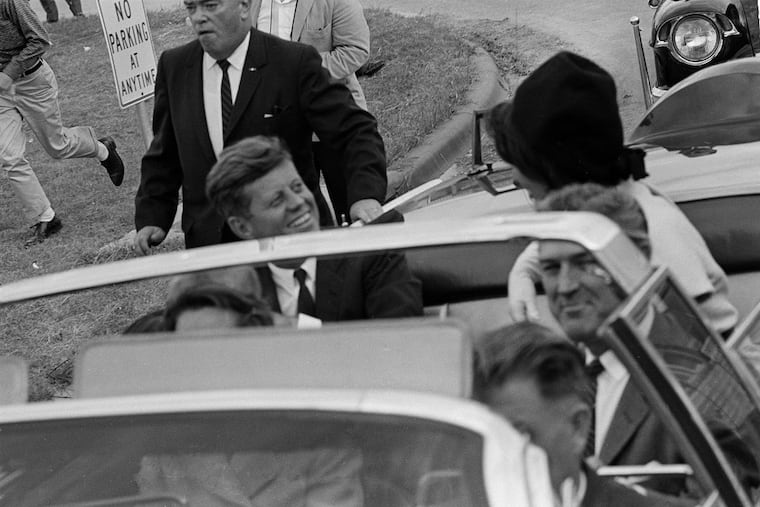5 new revelations from the JFK assassination files
It will take weeks for experts to comb through the 2,800 documents released about the Kennedy assassination. But here are five things we learned on day one.

The Trump administration has released 2,800 previously classified documents related to the assassination of President John F. Kennedy.
It will take weeks to go through all of the declassified documents, but an early look at some of the released memos and interviews offers a fascinating view of the scramble to make sense of the Nov. 22, 1963, killing in Dallas. They also offer a rare glimpse into the secret worlds of CIA spies and FBI informants.
Here is a roundup of some of the revelations from some of the memos, as well as a wild tidbit or two.
1. FBI informant claimed Dallas police officer was real assassin
According to an April 1964 note, an informant claimed to the FBI that slain Dallas police officer J.D. Tippit was the real gunman behind Kennedy's assassination.
The informant also told the FBI that a week before the assassination, Tippit met with a third party — possibly gunman Lee Harvey Oswald — at Jack Ruby's nightclub.
About 45 minutes after the assassination, Tippit was in his patrol car when he stopped Oswald, who was walking toward a movie theater. According to information released during the Warren Commission hearings, the two reportedly exchanged words through an open vent window. When Tippit got out of the car, Oswald shot the officer four times and fled. Tippit died before authorities arrived at the scene.
Ruby would later kill Oswald on live television while he was in police custody. Ruby was convicted in Oswald's murder, but the ruling was overturned. He died of lung cancer prior to his retrial.
2. Hoover said the public must believe Oswald acted alone
During the chaos following the assassination and subsequent killing of Oswald, FBI Director J. Edgar Hoover worried that the public would look to conspiracy theories and not believe that Oswald was the real assassin.
"The thing I am concerned about, and so is [Deputy Attorney General Nicholas] Katzenbach, is having something issued so we can convince the public that Oswald is the real assassin," Hoover wrote in a November 1963 memo.
Hoover also wrote that the night before Oswald died, the FBI's Dallas office received a call from a man "talking in a calm voice and saying he was a member of a committee organized to kill Oswald."
Hoover said he forwarded the warning to the Dallas Police Department, which assured him Oswald would be carefully guarded. Ruby shot Oswald the next day.
3. Oswald spoke to a KGB agent in the department responsible for assassinations
A memo from Nov. 23, 1963, reveals that Oswald secretly met with Russian spies at the Soviet Embassy less than two months before the assassination.
He met with Valeriy Kostikov, a KGB agent the FBI said worked for the agency's 13th Department, which was "responsible for sabotage and assassination," on Sept 28.
4. Soviets thought Lyndon B. Johnson was behind the assassination
According to an FBI memo on the Soviet reaction to Kennedy's death, Soviet spies believed President Lyndon B. Johnson was behind the assassination plot.
The memo, dated December 1963, outlines information from a source who said Soviet officials "believe there was some well-organized conspiracy on the part of the 'ultra right' in the United States to effect a 'coup,' " and that Kennedy's assassination "had been planned by an organized group rather than being the act of one individual assassin."
According to a second source, citing intelligence from 1965, the KGB was in possession of information "purporting to indicate President Johnson was responsible" for Kennedy's assassination, and indicated Johnson was "practically an unknown" to the Soviets.
The Soviets also claimed to view Oswald as a "nutjob" who visited Russia but was denied a longer stay because he was "mentally unstable."
5. British newspaper got a tip minutes before Kennedy’s assassination
According to a Nov. 26, 1963, memo from CIA Deputy Director James Angelton, the British newspaper the Cambridge News received a tip that a reporter "should call the American Embassy in London for some big news, and then hung up."
According to Britain's MI5 intelligence service, the newspaper received the call 25 minutes before Kennedy was killed. The reporter, who MI5 noted was "sound and loyal," said he'd never received a call of that kind before.
Anna Savva, a reporter at the News, told the Associated Press the paper has no record of the tip being taken.
"We have nothing in our archive — we have nobody here who knows the name of the person who took the call," she said.